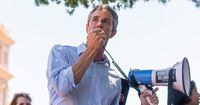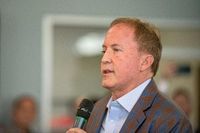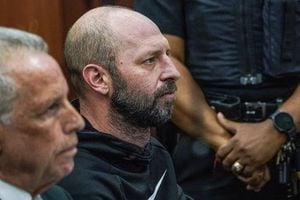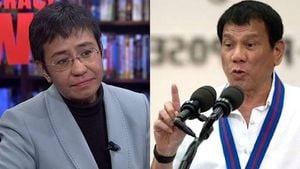In a dramatic escalation of Texas' ongoing political standoff, a Tarrant County judge on August 8, 2025, temporarily blocked former U.S. Representative Beto O’Rourke and his political organization, Powered by People, from raising or spending money to support Democratic lawmakers who fled the state. The ruling follows a flurry of legal action by Texas Attorney General Ken Paxton, who accuses O’Rourke and his group of orchestrating an unlawful fundraising scheme to bankroll the Democrats’ out-of-state protest against a GOP-backed redistricting plan.
The legal battle is the latest twist in a saga that has gripped the Lone Star State for weeks, as more than 50 Democratic state legislators left Texas to deny Republicans the quorum needed to advance a controversial redistricting bill. The measure, supported by former President Donald Trump, could give the GOP up to five additional congressional seats in the next election cycle, according to The Texas Tribune.
Attorney General Paxton, a Republican, wasted little time in seeking a temporary restraining order against O’Rourke and Powered by People. In his lawsuit, Paxton alleges that the group solicited donations under the guise of political fundraising but instead used the funds to cover personal expenses for the absent lawmakers—including travel, lodging, and dining. "Democrat runaways are likely accepting Beto Bribes to underwrite their jet-setting sideshow in far-flung places and misleadingly raising political funds to pay for personal expenses," Paxton declared in a statement, as reported by Nexstar Media.
District Judge Megan Fahey, who was appointed by Republican Governor Greg Abbott in 2019 and has since been re-elected, sided with the state. In her order, she wrote, "the Court finds that harm is imminent to the State, and if the Court does not issue the Temporary Restraining Order, the State will be irreparably injured." Fahey further stated that O’Rourke and his group’s fundraising "constitutes false, misleading, or deceptive acts" under Texas law.
The temporary restraining order prohibits Powered by People from fundraising or using funds already raised to cover travel, hotel bills, or meals for "unexcused Texas legislators during any special legislative session called by the Texas Governor." A hearing on a more permanent injunction is set for August 19, 2025, giving both sides a narrow window to prepare their next moves.
The financial stakes are high for the Democratic lawmakers, who face $500-per-day fines for their absence, on top of the mounting costs of living away from their homes. According to The Texas Tribune, Powered by People has been a primary source of funding for these expenses, providing air travel, lodging, and logistical support to the quorum breakers. However, it is not the only group involved—Paxton’s office has also launched an investigation into another organization reportedly funded by George Soros.
Paxton’s legal filings go further than just freezing O’Rourke’s fundraising. In a separate petition to the Texas Supreme Court, he seeks to remove 13 Democratic representatives from office, arguing that their absence constitutes a deliberate sabotage of the constitutional process. "These cowards deliberately sabotaged the constitutional process and violated the oath they swore to uphold," Paxton said, as quoted by The Texas Tribune. He contends that if his request is granted, Governor Abbott would be able to call special elections to fill the vacant seats, potentially shifting the balance of power in the House.
O’Rourke, for his part, has fiercely denied any wrongdoing and vows to keep fighting. Shortly after Paxton’s lawsuit was announced, O’Rourke revealed that he had filed his own suit against Paxton in El Paso County district court. "We just sued Ken Paxton in state court. Taking the fight directly to him," O’Rourke posted on X (formerly Twitter). In a statement, he argued, "Paxton is trying to shut down Powered by People, one of the largest voter registration organizations in the country, because our volunteers fight for voting rights and free elections… the kind of work that threatens the hold that Paxton, Trump, and Abbott have on power in Texas."
O’Rourke’s group claims its efforts go beyond political maneuvering, highlighting its role in registering hundreds of thousands of voters and volunteering at Texas food banks. During the state’s 2021 electricity grid failure, Powered by People organized more than a million calls to connect seniors to warming centers and safety, and purchased nearly a million dollars in supplies for Texans left vulnerable by the crisis. O’Rourke insists, "He wants to silence me and stop me from leading this organization. He wants to stop us from fighting Trump’s attempt to steal the five congressional seats he needs to hang on to power. But I’m not going anywhere."
The legal wrangling has exposed deep partisan rifts. Democrats frame their walkout as a necessary stand against what they view as an unconstitutional, discriminatory redistricting map. They argue that their absence is an act of conscience, honoring their constituents’ wishes to resist a power grab that could dilute minority representation. Republicans, meanwhile, see the walkout as a dereliction of duty and a cynical ploy to stall the legislative process. They have responded with a barrage of legal filings, threats of expulsion, and even calls for law enforcement assistance in tracking down the absent lawmakers.
Judge Fahey’s decision is a significant, if potentially temporary, victory for Paxton and the state’s Republican leadership. The order not only halts a key source of financial support for the Democrats but also sets a precedent for how far state officials can go in policing political fundraising and legislative protest. Still, the fight is far from over. The August 19 hearing looms large, and both sides are preparing to make their case before the court—and the Texas public.
Adding another layer of intrigue is the political context: Paxton is currently challenging U.S. Senator John Cornyn in the GOP primary, and O’Rourke remains a high-profile figure in Texas Democratic circles. Both men have much at stake, not just in the courtroom but in their broader political ambitions.
As the legal and political drama unfolds, Texans—and the nation—are watching closely. The outcome could have lasting implications for the state’s political landscape, the boundaries of protest, and the rules governing campaign finance. For now, the battle lines are drawn, and neither side appears willing to back down.
With the clock ticking toward the next hearing, the future of Texas’ legislative standoff—and the fate of its most prominent political players—remains uncertain.






